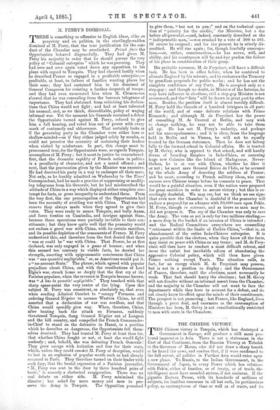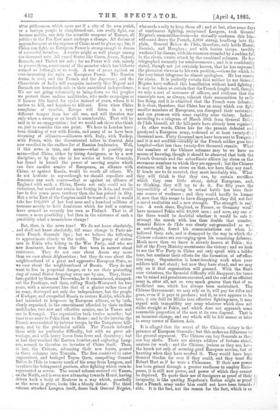THE CHINESE VICTORY.
THIS Chinese victory in Tonquin, which has destroyed a Government in Europe, will produce a still more profound impression in Asia. There is not a statesman in the East of that Continent, from the Russian Viceroy at Tobolsk to the Governor of Macao, who did not draw a sharp breath as he heard the news, and confess that, if it were confirmed to the full extent, all politics in Further Asia would enter upon a new phase. To Russia, to the Indian Government, to the Government of Japan, to every Power which has relations with Pekin, either of frontier, or of treaty, or of trade, the intelligence must have sounded serious, if not ominous. , If the gigantic Eastern Power, with its hundreds of millions of subjects, its limitless resources in all but cash, its pertinacious policy, so contemptuous of time as well as of waste, and its utter pitilessness, which cares not if a city of its own perish, or a foreign people is slaughtered-out, can really fight, can become mobile, can defy the scientific weapons of Europe, all politics in the Far East must undergo a change. All dreams of aggrandisement at the expense of China must be given up; for, if China can fight, no European Power is strong enough to dream of successful invasion. A terrier might as well plunge among ten thousand rats. All vassal States like Corea, Anam, Nepaul, Burmah, and Thibet are safe ; for no Power will risk, merely to possess them, a movement of the monster which has hitherto seemed so lethargic or so weak. A war of years against an ever-increasing foe suits no European Power. The Russian dream is over, and the French and the Japanese ; and the Chauvinists of India will recognise instantly that Nepaul and Burmah are henceforth safe in their anarchical independence. We are not going voluntarily to bring-down on the peoples we protect those endless multitudes, who make campaigns as if human life lasted for cycles instead of years, whom it is useless to kill, and hopeless to kill-out. Even when China complains of treaties, Europe will listen in a very different, temper from her old one, and will threaten war only when a wrong or an insult is unendurable. That will be said to be an exaggeration ; but we would ask those who think so, just to consider this one point. We here in London have been thinking of war with Russia, and many of us have been dreaming of alliances,—alliances with Italy, with Turkey, with Persia, with the discontented tribes in Central Asia now enrolled in the endless list of Russian feudatories. Well, if this news is true, and means—what it possibly may mean—that China, either by hiring foreigners, or by a new discipline, or by the rise in her service of better Generals, has found in herself the power of moving armies which can face smaller armies of Europeans, an alliance with China, as against Russia, would be worth all others. We do not hesitate to say—though we should repudiate and denounce any such course—that as against an alliance of England with such a China, ifussia not only could not be victorious, but could not retain her footing in Asia, and would lose in five years more territory than she has gained in fifty. Not a tribe East of the Caspian could be trusted ; and it would take her 10Q,000 of her best men and a hundred millions of treasure merely to hold dominions which for half a century have seemed as securely her own as Finland. That is, of course, a mere possibility ; but then in the existence of such a possibility what a tremendous change !
But, then, is the news true ? We do not know absolutely, and shall not know absolutely, till some change in Paris unseals French Generals' lips ; but we believe the following to approximate closely to the truth. The group of statesmen in Pekin who belong to the War Party, and who are now dominant, have from the first been in earnest about resistance. They do not care about Anam any more than we care about Afghanistan ; but they do care about the neighbourhood of a great and aggressive European State, as we care about the neighbourhood of Russia. They do not want to live in perpetual danger, or to see their protecting ring of vassal States dropping away one by one.. They, therefore, guided by General Tso—who, be it remembered, stampedout the Panthays, and then, rolling North-Westward for two years, with a movement like that of a glacier rather than of an army, destroyed not only the independence, but the people of Kashgar, and compelled Russia to restore Buldja, which she had intended to keep—or by European officers, or by both, slowly organised, in the concealment afforded by their endless multitudes, two new and effective armies, one in Yunan and one in Kwangsi. The organisation took twelve months ; but time is no more to Pekin than to Rome ; and in the interim the French were resisted by inferior troops, by the Tonquinese
hill
men, and by the provincial militia. The French defeated these with no particular difficulty, but with no great advantage, and with heavy losses from fever and dysentery ; but at last ;hey reached the Eastern frontier, and capturing Langson, seemed to threaten an invasion of China itself. Then, at last, the Chinese, advancing their new forces, poured in three columns into Tonquin. The first contrived to enter unperceived, and besieged Tuyen Quen, compelling General Briere de l'Isle to remove much of his army from Langson, and to relieve the beleaguered garrison, after fighting which even he represented as severe. The second column entered yid Yanan, on the North, and is even now advancing towards Hanoi, having driven back a body of Zodaves in a way which, guardedly as the news is given, looks like a bloody defeat. The third column attacked Langson itself, drove back General Negrier,
who made a sally to keep them off; and at last, after some days of continuous fighting, recaptured Langson, took General Negrier's ammunition-train--he virtually confesses this himself—and drove the French, 5,000 strong, headlong into the plain. General Briere de l'Isle, therefore, only holds Hanoi. Bacninh, and Hunghoa ; and with beaten troops, terribly weakened by disease, with his steamers stranded by a sudden fall in the rivers, awaits attack by the combined columns. He has telegraphed earnestly for reinforcements ; and it is confidently stated, though not yet certainly known, that he has expressed the gloomiest views as to his own position,—views for which in. the very latest telegrams he almost apologises. He has reason for alarm. It is perfectly certain that neither he nor Genera'. Ndg,rier have suffered this humiliation without hard fighting ; it may be taken as certain that the French fought well, though we note a sort of massacre of officers, and evidence that the conscripts now, as always, exhaust their ammunition by reekless firing, and it is admitted that the French were defeated. It is clear, thexefore, that China has an army which can fight smaller numbers of Europeans, can disregard their resistance: and can press-on with some rapidity after victory. Indeed. according to a telegram of March 30th from General Brier,. de l'Isle himself, all the hill-posts have already been regained. In other words, China has for the present defeated and paralysed a European army, reckoned at at least twenty-five ; thousand men. Forty thousand men have been sent to Tonquin ; I and it is not credibtli—mxthe French soldier goes into hospital—that less than twenty-five thousand remain. What the numbers of the Chinese columns may be we have no means of knowing, though it should be observed that both the French Generals and the subordinate officers lay stress on the enormous numbers to which they are opposed ; but the Chinese statesmen will lay no stress on that, nor have they any need. If heads are to be counted, they must inevitably 'win. What they will think is that they can, by certain sacrifices which they care little about, defeat Europeans, and, so thinking, they will try to do it. For fifty years the impossibility of winning in actual battle has been their one source of weakness ; and they would hardly be human if, now that this seems to have disappeared, they did, not feel a novel exultation and a new strength. The strength is real, too. A week since, England, or France, or Germany would have menaced Pekin with 40,000 men ; and now, any one the three would be doubtful whether it would be safe to attempt the maroh with less than double that number. General Briere de lisle was clearly out-generalled as well as out-fought, found his communications -cut when he believed them safe, and is dismayed by the way in. which the , Chinese colutins are converging upon his remaining defences. Much more than we know is already known at Pekin ; the fall of the Ferry Ministry accentuates the victory ; and we look to see the War Party in China not only speak with a bolder tone, but continue their efforts fin. the formation of art effective army. Organisation is heart-breaking work when your soldiers will not stand ; but now they have stood, and we may rely on it that organisation will proceed. With the State once victorious, the financial difficulty will disappear; for taxes can be raised and peculators executed, and the cost of an efficient army is, after all, not so very much greater than that of an inefficient one, which has always been maintained. The Chinese Government, we may rely on it, will pay for rifted and guns, even if it pays in produce ; and if, as now appears to be true, it can drill its Militia into effective fighting-men, it may regard with tranquillity any army whatever which does not strike straight at Pekin, and which does not approach some reasonable proportion of the men at its own disposal. That is an immense change, and one which will be felt sooner or later in every corner of Eastern Asia.
It is alleged that the secret of the Chinese victory is the presence of European Generals ; but this makes no difference to the general argument. The Chinese can buy Generals as thej, can buy shells. There are always soldiers of fortune about, anxious for work ; and the Chinese, jealous as they are, have the knack not only of securing good European service, but of knowing when they have seethed it. They would have kept General Gordon for ever if they could, and they trust Sir Robert Hart as if he were a Chinaman. If their new power has been gained through a greater readiness to employ Europeans, it is still new power, and power of which they cannot be deprived. To quote their use of foreigners as proof of their incapacity, is like quoting Napoleon's Italian origin as proof that a French army under him could not have been formidable. It is the fact, not the reason for the fact, which is so
important ; and the fact remains that, after a sharp struggle with the Chinese, a French army which did hold Tonquin now holds only the ground it stands on.




































 Previous page
Previous page